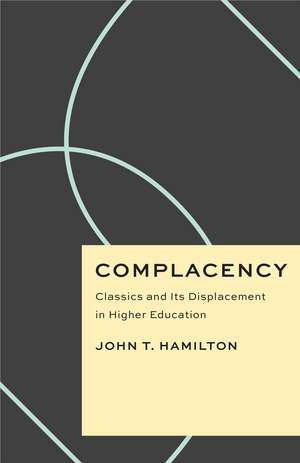Complacency: Classics and Its Displacement in Higher Education: Critical Antiquities
Autor John T. Hamiltonen Limba Engleză Paperback – 22 apr 2022
In response to philosopher Simon Blackburn’s portrayal of complacency as a vice that impairs university study at its core, John T. Hamilton examines the history of complacency in classics and its implications for our contemporary moment.
The subjects, philosophies, and literatures of ancient Greece and Rome were once treated as the foundation of learning, with everything else devolving from them. Hamilton investigates what this model of superiority, derived from the golden age of the classical tradition, shares with the current hegemony of mathematics and the natural sciences. He considers how the qualitative methods of classics relate to the quantitative positivism of big data, statistical reasoning, and presumably neutral abstraction, which often dismiss humanist subjectivity, legitimize self-sufficiency, and promote a fresh brand of academic complacency. In acknowledging the reduced status of classics in higher education today, he questions how scholarly striation and stagnation continue to bolster personal, ethical, and political complacency in our present era.
| Toate formatele și edițiile | Preț | Express |
|---|---|---|
| Paperback (1) | 165.23 lei 6-8 săpt. | |
| University of Chicago Press – 22 apr 2022 | 165.23 lei 6-8 săpt. | |
| Hardback (1) | 534.66 lei 3-5 săpt. | +15.40 lei 6-12 zile |
| University of Chicago Press – 26 apr 2022 | 534.66 lei 3-5 săpt. | +15.40 lei 6-12 zile |
Preț: 165.23 lei
Nou
Puncte Express: 248
Preț estimativ în valută:
31.62€ • 32.95$ • 26.18£
31.62€ • 32.95$ • 26.18£
Carte tipărită la comandă
Livrare economică 03-17 aprilie
Preluare comenzi: 021 569.72.76
Specificații
ISBN-13: 9780226818627
ISBN-10: 0226818624
Pagini: 144
Dimensiuni: 140 x 216 x 13 mm
Greutate: 0.18 kg
Ediția:First Edition
Editura: University of Chicago Press
Colecția University of Chicago Press
Seria Critical Antiquities
ISBN-10: 0226818624
Pagini: 144
Dimensiuni: 140 x 216 x 13 mm
Greutate: 0.18 kg
Ediția:First Edition
Editura: University of Chicago Press
Colecția University of Chicago Press
Seria Critical Antiquities
Notă biografică
John T. Hamilton is the William R. Kenan Professor of German and Comparative Literature at Harvard University. He is the author of Soliciting Darkness; Music, Madness, and the Unworking of Language; Security; and Philology of the Flesh, the latter also published by the University of Chicago Press.
Cuprins
The Wolf on the Plain
Sin in the Academy
Colonial Planning
Propositional Surfaces
Classical Platforms
Philology as Ancilla Facultatum
Philological Investigations
Pleasingly Flat
Platea
The War on Complacency
The Golden Age
Institutions
The Humanities
Notes
Works Cited
Index
Sin in the Academy
Colonial Planning
Propositional Surfaces
Classical Platforms
Philology as Ancilla Facultatum
Philological Investigations
Pleasingly Flat
Platea
The War on Complacency
The Golden Age
Institutions
The Humanities
Notes
Works Cited
Index
Recenzii
"With a fast-paced text in thirteen pithy chapters, brief endnotes, and an index nominum, John T. Hamilton’s Complacency will inspire classicists to reconsider their attitude towards their work and the place of their field in academia."
“Hamilton has given us an extended essay on the theme of complacency, taking as his starting-point an opinion piece from 2009 by the philosopher Simon Blackburn, which characterizes it as one of the deadly ‘sins’ of the academy. He draws on etymology and wordplay to explore the imagery and resonances of complacency in different historical contexts from antiquity to the present, not simply in its familiar associations of (self-)satisfaction, but, strikingly, in the imagery of ‘flatness’ that Hamilton explores in novel and thought-provoking ways. Readers will be diverted and challenged in turn, and all should come away with fresh perspectives on this topic.”
“Hamilton’s investigation of ambivalence in the long conceptual history of complacency sparkles. This nimble critique targets the blindnesses of classicism—justifying empire, flattening difference through universalism, any form of domination promising ease—wherever they are found, in science, business, higher education, or the discipline of classics itself. The solution is nevertheless ancient: to search, relentlessly and with love, for understanding and self-knowledge in all their contingent particularity.”
“This beautiful book details a vision for the future of the humanities. It is not a plan, but a call to avoid the easy route, to stay attentive, to keep our eyes and ears open. This is a vital message from one of today’s most important voices.”
"This is a tract for the times, addressing the identity crisis in our subject with a stirring call to philological arms ... A challenging, exhilarating and thought-provoking little book which wears its heart on its philological sleeve and pulls no punches either in argument or in style."

